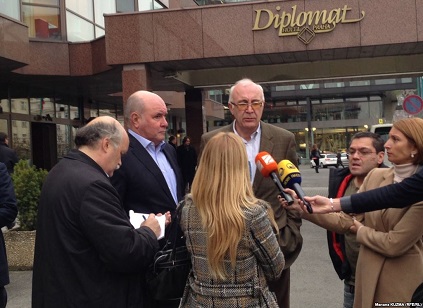Georgia-Russia informal talks planned for July 7 and 9

Georgian and Russian experts will hold two informal meetings on July 7 and 9 in Prague.
At the meeting, the parties are expected to discuss the changed state of affairs following Georgia’s signing of the Association Agreement (AA) with the European Union (EU), which includes the Deep and Comprehensive Free Trade Area (DCFTA) agreement.
The Georgian delegation will be presented by two or three officials from the Ministry of Economy and Sustainable Development. The Ministry has not specified who will attend the dialogue.
Two days after the information-expertise meeting is held Georgia’s special envoy to Russia Zurab Abashidze will meet special envoy to the Russian Government Grigory Karasin. It will be the seventh time the pair will meet since these specific negotiations launched in December 2012.
Abashidze believed the main topic of discussion between himself and Karasin would be bilateral trade relations between Georgia and Russia and the changes experienced since mid-2012 when Moscow removed an embargo on imports of Georgia’s agricultural products.
"There are no expectations of any kind of sensation and drama from the dialogue. It will be only an informational-expertise meeting and we believe [it] would be both interesting and useful,” Abashidze said in an interview with Georgian Public Broadcaster.
Abashidze also said the Georgian Government did not see possible resistance to it having free trade with EU countries while at the same time deepening the trade relations with neighbours, including Russia.
"I believe our Russian colleagues will have the same opinion on this issue too,” he added.
On June 26 – one day before Georgia signed the AA with the EU, Russia’s Foreign Minister Sergei Lavrov said as soon as the AA comes come into force, Moscow would analyze whether it adversely affects the CIS free trade zone [and if it did] Russia would take defensive steps on those conditions, on which they had joined the World Trade Organization.
However, Abashidze believed there were international standards in trade relations between countries and they would communicate with Russia concerning those "standards and the rules of playing”.
"There is the basis to continue informal dialogue on trade relations with Russia,” Abashidze said.
He also stressed that Georgia had the full support of the EU to continue this kind of dialogue with Russia.
"It was the success of Georgia’s international policy to sign the AA with the EU while simultaneously continuing relations with Russia. We will continue this way with our precise steps in future,” Abashidze said in the TV interview.
Meanwhile, Abashidze has not excluded the possibility of another information-expertise meeting in the future. "If it will be needed we are ready to hold it,” he added.
Earlier yesterday Georgia’s breakaway region Abkhazia, which is backed by Russia, issued a statement that said signing of the AA by Tbilisi with the EU may prompt Sokhumi’s "additional efforts to strengthen and deepen its strategic partnership” with Russia.
In a statement on June 30, the breakaway region’s Foreign Ministry said Abkhazia "has nothing to do with Georgian-European agenda”.
"It is quite obvious that signing of the Association Agreement with the EU does not provide Georgia an immediate perspective for membership in this union, but at the same time, it distances Georgia from cooperation with neighboring states, first of all, with the Russian Federation and Republic of Abkhazia,” it said.
Meanwhile, in his speech at the signing ceremony of the Association Agreement in Brussels on June 27 and in many previous occasions, Georgia’s Prime Minister Irakli Garibashvili offered the citizens of Georgia’s breakaway regions to enjoy the opportunity and benefits the AA would offer.
"My brothers and sisters – Abkhazians and South Ossetians. My dears, we are all children of one country… You have the unique opportunity to enjoy benefits provided by the association with Europe,” Garibashvili said at the signing ceremony.
 Tweet
Tweet  Share
Share